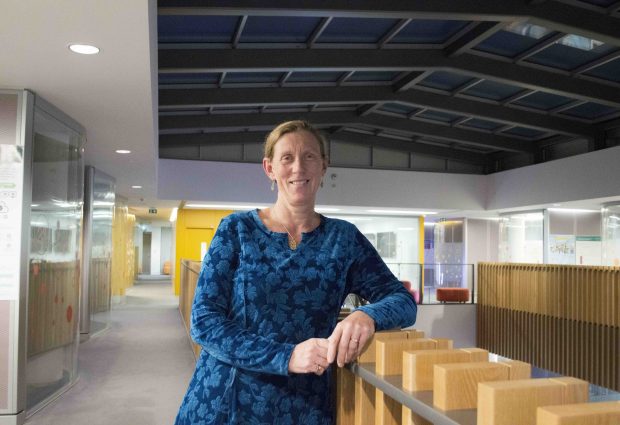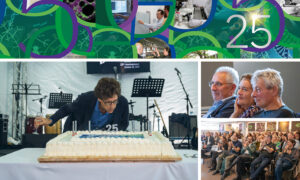
Welcome: Sarah Butcher
EMBL-EBI's new Software Development and Operations team set to build bridges between scientists and software developers

Dr. Sarah Butcher joined EMBL-EBI to lead the recently formed Software Development and Operations (SDO) team in the Technical Services Cluster. Her team aims to develop, adapt and operate software that supports the ever-evolving needs of biological data service operators and users.
Q: Tell me a little bit about yourself.
I trained as a biologist and did my PhD at the National Institute of Medical Research in London. There, I trained as a cellular immunologist working on mouse models of flu. After this, I did a postdoc on virology at the NERC Institute of Virology and Environmental Microbiology in Oxford.
I worked on a set of viruses that are notorious today – the noroviruses, associated with ‘winter vomiting disease’.
Q: How did you get into bioinformatics?
During my first postdoc, I had to learn to use a clunky connection system, which allowed us to search what used to be known as ‘the EMBL database’ – today’s European Nucleotide Archive (ENA). That was the first time I really used computers in my research. During my PhD I remember doing multiple sequence alignments on squared paper, because that’s all we had access to.
I soon realised that using a computing system to analyse my data was a very handy skill to have, and I started helping others in my institute to do the same.
Basically, I started as a wet-lab biologist who was frustrated by computers and ended up launching the bioinformatics service at Imperial College London.
Q: What does your current role entail?
The Software Development and Operations team builds and adapts software for EMBL-EBI, improving access to internal services such as resource management and long-term file archiving.
It contributes expertise to internal and external projects in areas such as authentication, dataset distribution, and cloud deployment. It’s quite a big team of software developers, systems administrators and DevOps engineers working collaboratively with EMBL-EBI teams, and external project-based collaborators.
We also support external projects such as the Human Cell Atlas, BioExcel 2 and a number of ELIXIR implementation studies.
Q: What are you hoping to achieve?
I’d like to use my experience in bioinformatics and service provision to help bridge the gap between the people who develop and maintain EMBL-EBI data resources and the researchers who use them, within and outside the institute.
As someone who has sat in all areas – frustrated user, researcher, software producer and service provider – I’d like to think that I can assist communications on all sides.
I’m particularly excited about drawing on the user experience (UX) expertise at EMBL-EBI, because it’s an excellent resource that I haven’t had access to previously.
Q: Why did you choose EMBL-EBI?
EMBL-EBI is a go-to place for bioinformatics in Europe, so people tend to gravitate towards it. I’m looking forward to working in such a bespoke environment with access to cutting-edge facilities.
On a practical basis, I’ve spent 16 years with a crazy commute; in fact, for the past six years, I’ve been passing EMBL-EBI on my way to work and back. I can’t believe I can finally swap a four-hour commute for a short cycle ride to work!
EMBL-EBI is a go-to place for bioinformatics in Europe
Q: What’s your advice for someone who’s thinking of applying for a technical role at EMBL-EBI?
Get in touch and have a chat because we might just have a role for you! It’s a great place to hone your skills using cutting-edge technologies in a big data environment.
Q: What’s the best advice you’ve ever received?
Get some sleep!
Q: What inspires you?
Curiosity and the pleasure of talking to others and trying to understand what they need. I don’t think you can work in this field without having a huge amount of curiosity.
This post was originally published on the Life at EMBL-EBI page.


